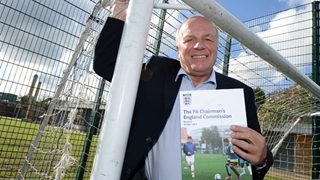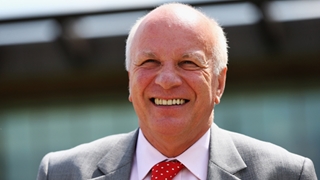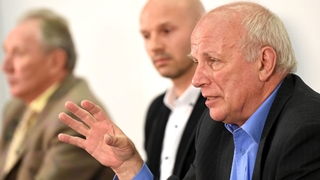
A plan to transform grassroots facilities and coaching across England is central to the second installment of Greg Dyke's FA Chairman's England Commission.
The latest and final report from the year-long study aimed at improving the prospects of the England senior men's team was unveiled in Sheffield on Friday.
Dyke described the “continuing reduction in the number of English players playing football at the highest level” as a “serious and growing problem for the future of English football”.
In order to meet this challenge, the Commission has focused on the entire pathway for players to ensure they can develop to the best of their potential.
Greg Dyke talks at a new AGP facility in Lowestoft
Facilities and coaching have been central to the work over the past 12 months, and Dyke has sought advice and support from across the game and beyond for the Commission's plans.
The report has proposed that by 2020 there will be:
- Football hubs in 30 cities, increasing the number of top-quality artificial grass pitches (AGPs) in urban areas by 130 per cent to more than 500
- Leading the way will be a pilot scheme in Sheffield, followed by Birmingham and Liverpool.
- A 50 per cent increase in the total number of full-size, publicly accessible 3G AGPs across England, to over 1,000.
- More than 150 new football-owned and managed football hubs to support the delivery of FA, County FA and professional club youth development and coach education programmes.
- More than 50 per cent of all mini-soccer and youth football matches - about 3,750 per week – being played on the best quality AGPs
The Commission has thanked the Government, Sport England, the Premier League, Sheffield City Council and Sheffield and Hallamshire County FA for their work on the new proposals.
“I welcome The FA’s plans to strengthen the game at the grassroots through improved facilities and coaching”
Helen Grant Sports minister
Minister for Sport Helen Grant said: “I welcome The FA’s plans to strengthen the game at the grassroots through improved facilities and coaching. This will build on the successful partnership between the government and football’s £102m Premier League and The FA Facilities Fund.
“I am keen to see what more we can do to help further improve the nation’s facility stock, putting 3G pitches in places that need them most, and I am continuing discussions with the football authorities on this front.”
Cllr Julie Dore, Leader of Sheffield City Council, said: “The people of Sheffield love their football. We play and watch the game in massive numbers – boys, girls and adults of all ages. However, like many cities, the council’s ability to fund football facilities is under severe pressure due to major budget cuts.
“I’m therefore delighted that the council and The FA have taken the initiative to work together on securing new national funding into our local facilities and in particular an emerging plan to offer additional state-of-the-art 3G artificial pitches. I’m also proud that Sheffield has been chosen first by the FA to trial this new national approach, this reflects Sheffield’s commitment to football combined with our ability to forge strong relationships with national partners.”
With regard to coaching, the Commission has considered and recommends a two-step solution.
Firstly, a new coach education organisation. It is proposed that all The FA’s education work, from coach education through to referee development and safeguarding, needs to be brought together in a single department.
This department would be led by a new Head of Education and he or she should report to a Technical Director who will be responsible for coaching overall and will sit on The FA’s executive.
The organisation would define and own a clear strategy for coach and player development.
Secondly, the Commission believes it is important that The FA sets ambitious coaching targets to be achieved over the next three years, building on the significant steps taken in recent years including the building of the national football centre at St. George’s Park.
England manager Roy Hodgson at a new facility in Biggin Hill, Kent
The report said the initial focus should be on increasing the numbers of skilled coach educators, which in turn will result in a greatly increased number of highly qualified coaches.
In summary, the Commission believes over the next three years the targets should be to:
- Recruit a further 25 full-time FA coach educators
- More than triple the number of Youth Award Level 3 coaches from 800 to 3,000
- More than triple the number of Advanced Youth Award holders from 200 to 750
- Increase the number of Pro Licence holders from around 200 to 300
- Set and deliver a target to significantly increase – above the levels of Football’s Inclusion and Anti-Discrimination Plan – the number of qualified coaches from BAME backgrounds and others who are under-represented, including female coaches
It adds that The FA should set further targets to improve the quality of existing coaches; adding formal assessment of their capabilities and providing them with excellent ongoing training and support.
The new report also provides updates on ongoing work on the lack of playing opportunities for players from 18-21, the consultation underway for changes to the rules governing work permits for non-EU players, and efforts to boost opportunities for home grown players across clubs.










